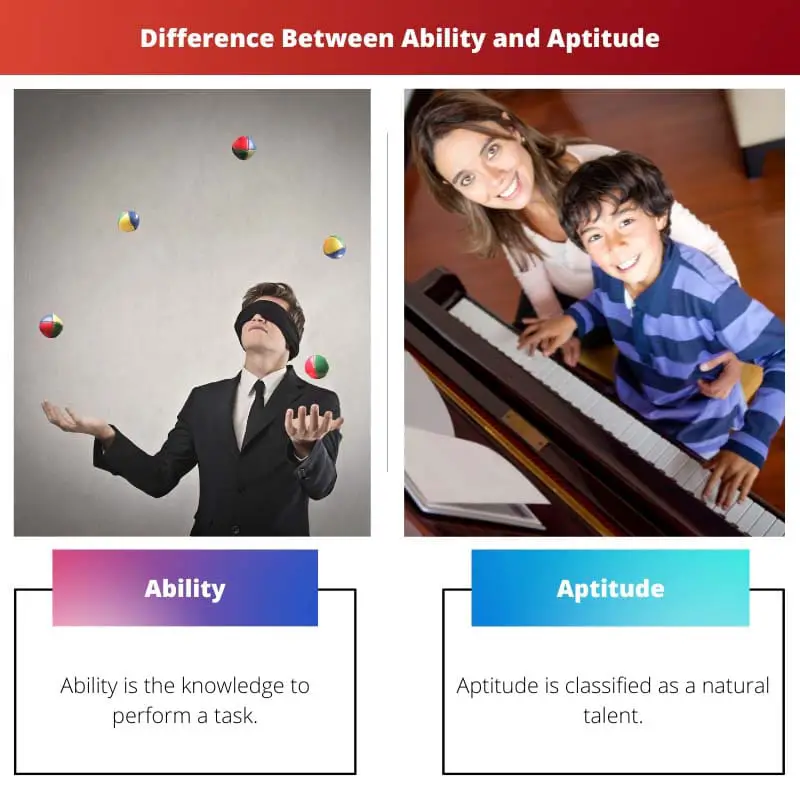Several terminologies are used interchangeably in everyday use. Likewise, the word ability and aptitude are used in our daily lives.
Both words refer to the competence of an individual in performing specific tasks. However, ability and aptitude are not identical.
There are differences in the meaning, nature, sense, and type of ability and aptitude.
Key Takeaways
- Ability refers to an individual’s current skill level or competency in a specific area, while aptitude is the potential to learn and excel in a particular field.
- Abilities are developed through practice and experience, whereas aptitude is innate and can be assessed through tests.
- Both ability and aptitude play crucial roles in personal and professional success, but aptitude can indicate future potential.
Ability vs Aptitude
Ability is a person’s existing skills and knowledge in a particular area, as well as their level of proficiency. Aptitude refers to a person’s natural talent or potential to learn and excel in a specific area, even if they have not yet developed the necessary skills and knowledge.

Ability refers to the power to do something. Ability is a skill that is prevalent in an individual now. While one individual can sing well, another individual may have the ability to paint well.
By definition, the word ability means the quality of being able—for instance, the ability of the soil to hold water.
The word ability first came into use in the 14th century.
Aptitude refers to the innate or acquired capacity to perform a task. Aptitude may connote the inclination or tendency for a particular skill—for instance, a facility for hard work.
The word aptitude first came into use in the 15th century. Some types of aptitude include physical, linguistic, and organisational aptitude.
Aptitude tests have a practical application in the hiring process.
Comparison Table
| Parameters of Comparison | Ability | Aptitude |
|---|---|---|
| Meaning | Ability is the knowledge to perform a task. | Aptitude is classified as a natural talent. |
| Measurement | Ability can not be measured. | Aptitude is measurable. |
| Sense | Aptitude is used concerning talent. | Aptitude can be linguistic, logical, physical, organisational, etc. |
| Nature | Ability is a skill. | Aptitude is an underlying potential. |
| Type | Ability may be specific or general, effective or transparent. | Aptitude can be linguistic, logical, physical, organisational, and so on. |
What is Ability?
Ability refers to the talents that an individual possesses beforehand. An ability is classified as an intelligent power.
An ability is guided by a person’s intent, and the successful execution of an ability results in an action.
There are several standard abilities, such as walking, dancing, or singing. However, there are some rare abilities, like performing a headstand.
A direct antonym of ability is the inability to do something. Some synonyms of knowledge are power and competency.
While ability is closely linked to aptitude, potential, skill, and disposition, there are some stark contrasts. There are two types of commands: general knowledge and specific ability.
General ability refers to the knowledge possessed by an individual regardless of their situation. In contrast, specific capacity refers to the knowledge maintained by an individual concerning a particular problem.
For instance, while a guitarist has the potential to play several different types of guitars, he lacks the corresponding specific ability if they are pinned to a wall or heavily drunk.
Although all abilities are viewed as powers, all powers are not categorised as abilities. Ability may also refer to the physical or mental competency to perform activities.
For instance, an athlete can run faster than an average individual. Another example is that an artist has significantly more artistic ability than a doctor or a surgeon.
Several theories of ability exist, including the conditional analysis, the modal approach, and the dispositional approach. A command may be effective or transparent.
While an ability that results from luck may be classified as practical, transparent ability connotes a stronger sense of competency-driven by expertise.

What is Aptitude?
Aptitude refers to the underlying potential of acquiring skills. Only a combination of talent and interest leads to success in life.
Individuals with a considerably high aptitude in a field are referred to as talented. For instance, musicians and artists are considered competent in their respective fields.
An aptitude may either be mental or physical. By definition, facility refers to developed knowledge, understanding, acquired abilities or attitude. The essential element of skill is that it is achieved through learning.
Several types of aptitude tests include the generalised aptitude tests and the multiple aptitude tests. Employers use such aptitude tests to assess the underlying potential of the job candidate.
Such tests may assess an individual’s ability in a wide variety of fields, such as problem-solving, decision-making, and numerical skills.
Some types of aptitude tests are abstract reasoning tests, clerical aptitude tests, verbal reasoning tests, general aptitude tests, logical reasoning tests, and spatial reasoning tests.
While one individual may have an aptitude for math and logic, another may have an aptitude for engineering and mechanics. Thus, different individuals may possess different skills.
Logical aptitude is one of the most common types of facility. Such an attitude allows individuals to arrive at analytical solutions to varied problems.
Spatial aptitude enables an individual to perceive spatial relationships effectively. Some other types of talent include physical talent, linguistic aptitude, mechanical aptitude, and organisational aptitude.
Main Differences Between Ability and Aptitude
- While ability is used concerning expertise, aptitude is used regarding talent.
- Ability is a skill. On the other hand, aptitude is an underlying potential.
- While ability is immeasurable, aptitude can be measured using various aptitude tests.
- Ability may be specific or general, effective or transparent. In contrast, aptitude can be linguistic, logical, physical, organisational, and so on.
- While ability is the knowledge to perform a task, aptitude is classified as a natural talent.


I found the section on the main differences between ability and aptitude very useful, and the inclusion of references adds credibility to the content.
The detailed explanation about the differences and similarities between ability and aptitude is quite informative. I enjoyed the article.
I agree, a very well-structured article.
This article is a prime example of high-quality educational content. The concepts are elucidated with precision, and the references validate the information presented.
The author has done a great job of presenting a thorough analysis of ability and aptitude. This article is a valuable resource for understanding these concepts.
I appreciate the comprehensive comparison table. It provides a clear overview of the disparities between ability and aptitude.
The article will help clear up any confusion that people might have between the two terms.